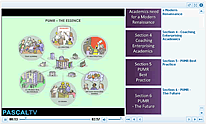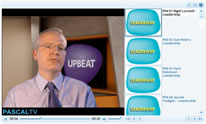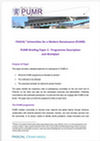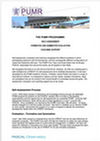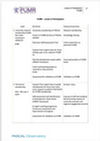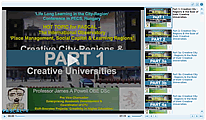Introducing PUMR
PASCAL Universities for a Modern Renaissance (PUMR)
PROJECT SUMMARY
What is PUMR?
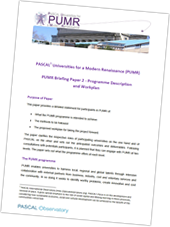
PUMR - A Formal Definition

PUMR stands for the PASCAL Universities for a Modern Renaissance programme. It refers to those universities, linked through the PASCAL International Observatory, who want to work together with regional partners for mutual benefit.
PUMR enables universities to harness local, regional and global talents through intensive collaboration with external partners from business, industry, civil and voluntary services and the community. In so doing it seeks to identify worthy problems, create innovative and cost effective solutions and co-produce successful systemic deliverables enabling real improvement. In short, it relates to all who want to become more innovative by placing themselves at the leading edge of knowledge and thus be truly competitive in the global knowledge economy.
This video introduces the main elements of PUMR. It shows the importance of universities working together, in deep collaboration and highly creatively, with regional partners, to enable all to flourish. Key partners who have work with PUMR report its strengths from their perspectives and how they became more innovative by placing themselves at the leading edge of knowledge and thus truly competitive for the global knowledge economy.
What is Distinctive about PUMR?
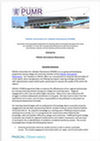
- Actively strive to co-identify significant problems and issues on which they can collaborate with strategic partners
- Co-create and co-design workable and sustainable products and processes locally relevant, but globally competitive and fit-for-purpose in the knowledge economy/society
- Co-produce solutions that lead to sustainable impact in the real world
- Continuously strive for increasing improvement in all developments, through formative evaluation and stretching the systemic boundaries to become best practice.
PUMR is Demand Focused
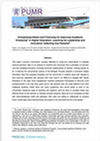
The PUMR article Demand Driven Systemic Solutions (right) concerns universities’ growing attempts to reach-out meaningfully to strategic external partners, often in an attempt to marshal new resources from a pluralism of sources, and thus enabling innovative university-business collaborations to flourish, creating wealth for all. It extends the conventional notions of the Bologna Process towards a European Higher Education Area that engages business and the community in creative ways with respect to their learning, especially with partners who have found it so difficult to engage with Higher Education in the past. Such engagement requires academics themselves to become more entrepreneurial in the way they reach out to new partners who are quite different from their traditional students.
Modern Renaissance
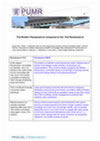
This is best understood by comparing the Traditional Renaissance with the Modern One. The original Renaissance or ‘Rebirth’ involved significant changes in social organisation, in scientific and artistic methods and in achievement, and philosophical attitudes based on a renewed interest in classical learning. The Modern Renaissance is based on a more complete and systemic understanding of the world now possible. In economics, the expansion of commerce on a global scale and, until recently, the growth in wealth; in science, improved observation and experiment with consequent enhancement of our knowledge about the universe; in philosophy, with the spirit of rational enquiry; in the arts, literature and design a golden age of creativity. And more importantly a new belief in the dignity and worth of the different talents, which individuals bring when working in trans-disciplinary teams developing innovative solutions centred on the needs of citizens and communities. So the Modern Renaissance it typically developed by teams of talented people, including academics, who can creatively work in trans-disciplinary ways to tackle real world problems, issues and challenges.
Leadership in PUMR
PUMR universities (or "PUMRs") coach their entrepreneurial academics to become the leaders of tomorrow’s forward-thinking, trans-disciplinary design and development teams. These universities know how to recognise the right academics to lead and be part of those creative teams, how to recruit the necessary talent to cope with the systemic nature for proper co-design and co-production, and rewarding successful academic leaders to retain their commitment.
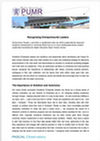
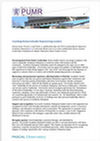
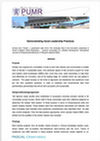
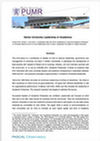
These are not traditional the ‘hero leaders’ reported on in most management schools, but rather entrepreneurial academics who know how to empower their teams to search for sustainable and ground breaking solutions which create true impact. They are ‘servant leaders’ to their teams, knowing when to be a part of the team, when to lead it themselves and when to encourage others in their teams to lead.
Coaching to develop academics to become smart leaders with real expertise is not trivial. Examples of those portraying the right skills may help you understand your needs.
PASCAL has proposed that the Leadership Foundation for Higher Education develop a programme for senior academic managers and Lay Members of University Councils to who want to improve their University’s relationships with business and the community.
Coaching for PUMR
PASCAL members have, between them, a vast experience of successful university-regional engagement and, as part of the PASCAL support, will offer coaching to bring any prospective PUMR toward best practices and become, what Dorothy Leonard[1], calls ‘deep smarts’. It is one thing to want to work to PUMR principles, and, quite another to have the degree, closeness and quality of engagement enabling universities, and their strategic partners, to flourish in collaboration together.
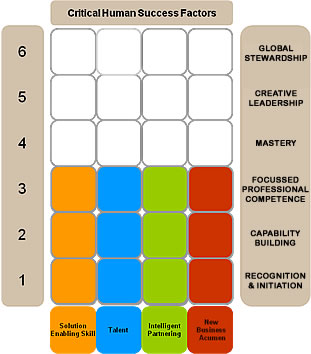
PASCAL therefore designs coaching programmes focused directly and personally towards the needs of any potential PUMR. It also uses a tried and tested benchmarking tool known as UPBEAT:
This simply and intuitively steers budding entrepreneurial academics to learn appropriate leadership, to know when their projects are going well and, particularly, how to improve them towards good practices when not.
Good PUMR Practices
PUMR can presently show over 130 examples of best practices developed by more than 25 universities around the world which conform to PUMR principles. As PUMR develops these will be extended as more universities reveal their own ten best practice cases and share their knowledge of how they were achieved. The cases all use the UPBEAT template to make cross comparison easier; to see some selected examples, please see PUMR Best Practice Cases.
There is also a complementary case of one evaluation of a university using UPBEAT - Salford University - showing what can be achieved by adopting the PUMR principles over time. The way UPBEAT was utilised is demonstrated on the one hand in the abstract for a forthcoming publication and on the other by a report of the same study. The latter provides an example of a different method of writing up an evaluation - this time for a research council.
How do you become a PUMR?
If your university has an overarching policy for high level, collaborative and quality engagement with real world issues you can self assess its acceptance to PUMR principles.
If it has such a vision or mission, can you reveal ten cases that would portray its good practices in engagement, ideally from projects which range across the whole of your university activity? If yes, PASCAL can validate you as a PUMR using its standard assessment procedures.
If you don’t feel you are yet at that level with either policies or cases, or just want coaching to do a better job, PASCAL can be engaged to help you on your way to becoming a significant PUMR, in real demand by your region, local business and local communities, but based upon best practices at a global level.
What does becoming a PUMR mean?
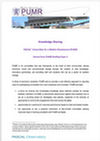
You will have access to the ‘virtuous knowledge sharing’ network being developed by PASCAL on the PUMR part of its web-site and be able to share knowledge of your growing best practices privately at first with your PUMR colleagues and, when you are ready, with the world in PASCAL’s open communications. It will allow participants to expand their knowledge base and ‘knowhow’ on a continuous basis, disseminating it through meetings, workshops, professional exchanges, peer consulting opportunities and formal publications outlets.
So the PUMR programme helps improve the effectiveness of regional partners by creating a learning network among college and university peers, and then with local businesses and communities. Regional engagement is still a new art within higher education. Many of our institutions still struggle to achieve widespread commitment to the goals, and even when they do commit, to delivering effective engagement. There is much to learn from the experiences of our peers, and we have a responsibility to the profession to document our learning and disseminate it broadly. Our growing learning network will do this.
Regional Recognition
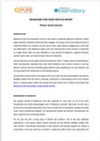
Our regional members of PASCAL have been encouraging us to develop the PUMR programme. They see validation as a PUMR to be shorthand, firstly, for those universities which engage in a deep and meaningful way with their regions and secondly, for those who are able and willing, through the PUMR network, to share best practices and learn from each other. Regions, in selecting with which institutions they would be prepared to collaborate closely, value PUMR status as an indicator of those able and prepared to give them best value.
PUMR's Heritage
PUMR was developed by the now Academic Director of PUMR, while he was Pro Vice Chancellor for Academic Enterprise at Salford University. It was based on a thematic network he co-ordinated for the European University Association (EUA)/ Socrates programme of work known as ‘Creativity in Higher Education’. Known as C5U this programme aimed at understanding how universities could be more creative with their regional partners and then presented as an early PASCAL ‘hot topic’. The video tells the story as linked elements’.
Salford University led and coordinated a thematic network known as C5U, which involved a consortium of seven European universities. This was part of a European University Association (EUA)/Socrates programme of work known as ‘Creativity in Higher Education’. The aim was to understand how universities were increasingly seeking to be creative in their relationships with their cities and regions.
Further Questions
You will see from the above that the CORE PASCAL PUMR team have done their best to answer the questions they have been asked to date in a straightforward way. If we have failed to communicate clearly or you have further questions to ask do not hesitate to contact either Professor James Powell or Dr Lesley Doyle directly.
[1] Leonard, D. and Swap, W. (2005) Deep Smarts: How to Cultivate and Transfer Enduring Business Wisdom Boston, MA: Harvard Business School
 Printer-friendly version
Printer-friendly version- 381 reads

